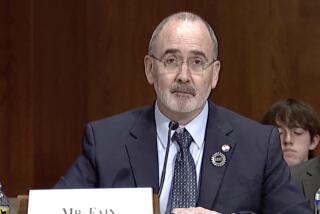All Work and No Play Is the U.S. Way
- Share via
Politicians and CEOs like to boast about the productivity of American workers. But here’s the dirty little secret: U.S. productivity is No. 1 in the world when productivity is measured as gross domestic product per worker, but our lead vanishes when productivity is measured as GDP per hour worked, according to the Organization for Economic Cooperation and Development, whose members are the world’s 30 most developed nations.
Productivity per hour is higher in France, with the U.S. at about the same level as other advanced European economies. As it turns out, the U.S. “productivity advantage” is just another way of saying that we work more hours than workers in any other industrialized country except South Korea. Is that something to brag about?
Europeans take an average of six to seven weeks of paid annual leave, compared with just 12 days in the United States. Twice as many American as European workers put in more than 48 hours per week. Particularly sobering is the fact that in two out of three American families with small children in which both parents work, the couples work more than 80 total hours per week, also more than double the European rate.
Confusing productivity with long work hours precludes a much-needed public debate about the costs and benefits of workaholism.
Conventional economic theory argues that Americans prefer the higher income gained from working extra hours, while Europeans prefer more family time and leisure. This truth may hold supreme among economists (and business reporters), but study after sociological study contradicts it. Sociologists have long documented that many Americans (men especially) want more family or leisure time and would be willing to sacrifice up to a quarter of their salaries in return. But they are prevented from working the hours they prefer for two different kinds of reasons.
Some Americans just need the money, given that the U.S. has the most unequal income distribution in the developed world. The average CEO of a major U.S. company, according to Business Week, is paid more than 400 times what the average worker is paid in the same company. In Britain -- the European economy with the most inequality -- that ratio is 45 to 1. Because the profits from Europe’s productivity increases are shared more equitably through shorter working hours and investment in education and healthcare, European workers can work fewer hours without worrying about creating a domino effect in which they first lose their jobs and then healthcare.
Other Americans who would gladly trade time for money cannot do so because the widespread demand for more family (and life-friendly) hours has not translated into good, reduced-hours jobs. In most workplaces, a shift to family-friendly hours is the kiss of death professionally, and a refusal to work overtime is reason for dismissal.
This leaves too many Americans with only two choices: a good job with health insurance at 50-plus hours a week or a dead-end job at 20 to 25 hours a week with depressed wages and no health insurance. The American economy, compared with Europe’s, has fewer jobs that are between 30 to 35 hours a week.
As a result, many families who would prefer both parents to be employed end up with Dad working 50 to 60 hours a week because Mom cannot find a quality, reduced-hours job. So many mothers drop out. One in four mothers are out of the labor force during the key career-building years, including many with professional or on-the-job training. This is a squandering of human capital that is typically overlooked in discussions of productivity and GDP.
A new and more promising way to fuel economic growth would be to offer good jobs with working hours that enable fathers as well as mothers to maintain an active involvement with family life as well as an active career.
*
Joan Williams is a professor and director and Ariane Hegewisch is a faculty fellow at the Program on WorkLife Law at American University Washington College of Law.
More to Read
Inside the business of entertainment
The Wide Shot brings you news, analysis and insights on everything from streaming wars to production — and what it all means for the future.
You may occasionally receive promotional content from the Los Angeles Times.










